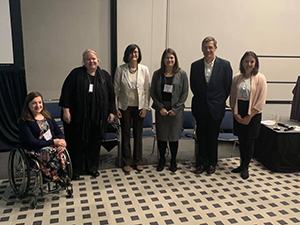Kentucky UCEDD Collaboration at ASHG
November 18, 2019

|
Staff representing University Centers of Excellence in Developmental Disabilities collaborated to deliver a presentation at the annual American Society of Human Genetics meeting in Houston, TX on October 18. Dr. Kara Ayers, Associate Director of the University of Cincinnati UCEDD, and Stephanie Meredith, Medical Outreach Director at The University of Kentucky Human Development Institute joined Dr. John Constantino, Director of the Washington University in St. Louis Intellectual and Developmental Disabilities Research Center, Dr. Igna Van den Veyver a leading Maternal Fetal Medicine Specialist from Baylor College of Medicine; Katie Stoll, Executive Director of the Genetic Support Foundation; and Dr. Marsha Michie, an anthropologist from Case Western Reserve University to address the intersection of disability and genetics. This presentation was made possible by ASHG, in collaboration with the Association of University Centers and NICHD.
Approximately 300 medical professionals attended this session that discussed the value of technology, the need to remember the patients at the other end of tests, and the prioritization of our collective humanity. "Nothing About Us Without Us!", was a core message of this presentation that identified tools and strategies to provide a forum for the voices of people with disabilities and their families, in conversations about genetics and medical practice. The meaningful dialogue focused on how to intentionally include the perspectives of people with genetic conditions (and their families) when creating guidelines and public policy--and to make that happen by acknowledging the painful history of stigmatization and abuse endured by people with disabilities throughout history and then building relationships with the medical community and putting humanity first.
AUCD Director, Andy Imparato, and former ASHG Director, David Nelson provided guiding leadership in setting up the forum. for this presentation, and Rodney Samaco, John Tschida, Rylin Rodgers, Luiz Valdez, Melissa Parisi, and Tracey King from AUCD and NICHD provided integral support. A session summary is provided below. :
Session Title: The Intersection of Genetics and the Disability Rights Movement: Beginning a dialogue about the impact of prenatal genetic screening and testing on historically stigmatized populations
Session Description: With the expansion of prenatal screening and testing, an increasing number of fetuses are being identified as having genetic variations that can lead to different disabilities. Many of these genetic conditions do entail serious health and cognitive issues. However, in a society where people with disabilities have been historically stigmatized through segregation and institutionalization, a genetic diagnosis can also lead to fears and misperceptions based on social biases, particularly when patients are not provided information or support to explain the social context of disability. Traditionally, the medical model of disability has focused on the health issues associated with various genetic conditions; however, research shows that patients also want information about evolving life outcomes and available supports and services. Unfortunately, research also shows that many patients are not provided the information and support they need to understand prenatally-diagnosed conditions in a social context. Toward that end, a bioethicist/anthropologist and a public policy expert will moderate a panel of interdisciplinary experts, including, a disability studies scholar/clinical psychologist, a geneticist, a clinician, and a patient education expert, who will present on the impact of genetic testing on social biases toward people with disabilities; the current implementation of screening and testing; the current status of the patient support and educational infrastructure; and a robust discussion with the audience about ways geneticists, disability rights scholars, clinicians, and public health policy experts can unify to create deliberate strategies to ensure the equitable representation of the disability rights movement in the genetics field.







